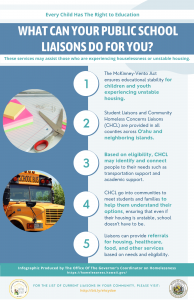There are nearly 3,600 students identified in unstable housing across the State of Hawaii, and families experiencing unstable housing have rights under the McKinney-Vento Act to ensure their children continue uninterrupted access to education and services.
Our student interns from the UH Thompson School of Social Work & Public Health created this page to highlight some of the frequently asked question surrounding minors experiencing homelessness or unstable housing.
Frequently Asked Questions
What is the age of majority in Hawaii?
The age of majority is the age at which a minor is presumed capable of making their own decisions. As defined in HRS 577-1, the age of majority in Hawaii is 18 years old.
Can a minor be emancipated in Hawaii?
Emancipation is the process that gives minors legal independence from their parents or guardians. This legally provides the emancipated minor with the capacity to act like an adult and be in control of their own affairs. In Hawaii, as per HRS 577-25 and 572-2, a minor can be emancipated by marriage if consent is provided by the minor’s parent or guardian.
Can minors consent to primary medical care services?
Yes! A minor who is at least 14 years old without parental support can consent to primary medical treatment and services such as screening, counseling, immunizations, medication, and treatment of illnesses or medical conditions customarily provided by licensed health care practitioners in a medical care setting. If minors consent to medical services without a parent or guardian’s consent, the parent or guardian is not responsible for payments charged for those services. Consult with your health care provider for options that may be available to you related to coverage or potential costs. For more information, please see HRS 577-D1 and HRS 577-D2, as well as this national resource that explains laws on minor consent to medical treatment.
What about invasive care such as surgery?
No! As detailed in HRS 577-D1, invasive care is excluded from primary medical care services.
How about immunizations?
As defined in HRS 577D-1, immunizations are included in the definition of primary medical care and services and HRS 577-D2 allows minors of at least 14 years of age to consent to these services. To see which immunizations may fall under primary care services, connect with your primary care doctor.
What about mental health services?
Act 37 SLH 2020, which became HRS 577-29, allows minors 14 years of age or older to consent to outpatient mental health services without the consent, knowledge or participation of their parents or legal guardians with the consultation and agreement of their licensed therapist. For more information, see this fact sheet from the Hawaii State Department of Health.
Can a minor receive substance abuse treatment?
Yes! According to HRS 577-26, minors can receive substance abuse treatment. The treatment counselor shall seek to open communication between the minor and the parent or guardian, unless that communication is deemed by the counselor to have a potentially negative impact on the course of the treatment.
How can an unaccompanied minor enroll in school?
Every child has a right to education regardless of their situation. The McKinney-Vento Homeless Assistance Act authorizes the federal Education for Homeless Children and Youth (EHCY) Program. The McKinney-Vento Act is the primary piece of federal legislation related to the education of children and youth experiencing homelessness or other unstable situations, such as overcrowded housing. Minors and youth in every district of Hawaii who are experiencing unstable housing situations can connect with DOE Community Liaisons in their area to maintain their education and find out what support may be available to them. As this resource page from the DOE states, “if your housing is unstable, your schooling doesn’t have to be.”
Can a homeless minor consent to no-cost emergency shelter and related services?
Yes! HRS 346-17.6, which has been furthered by Act 23, SLH 2021, allows for unaccompanied minors to consent to a no-cost emergency shelter. As long as the minor understands the benefits, responsibilities, risks, and limitations of free emergency shelter and related services and agrees to follow provider rules, cooperate with recommended services, and participate in those services, the minor may consent to the provision of free emergency shelter and related services.
Who can minors contact for connections to resources and assistance?
There are organizations in our community that can help guide minors to get the resources and assistance that they may need. The DOE has resources to help, including through Community Liaisons that serve minors and youth throughout the State who may be experiencing instability. Hawaii Youth Services Network can help to connect minors and youth throughout the State with resources in their local area. On Oahu, Residential Youth Services and Empowerment (RYSE) provides a number of services to minors and youth in need of a place to go and other services. While not minor and youth specific, homeless outreach service providers statewide can help to identify a person’s needs and connect them to the resources that could be most helpful to them.
Note: HRS indicates Hawaii Revised Statutes. SLH indicates Session Laws Hawaii.
For more information, please view any of the information infographics below:
